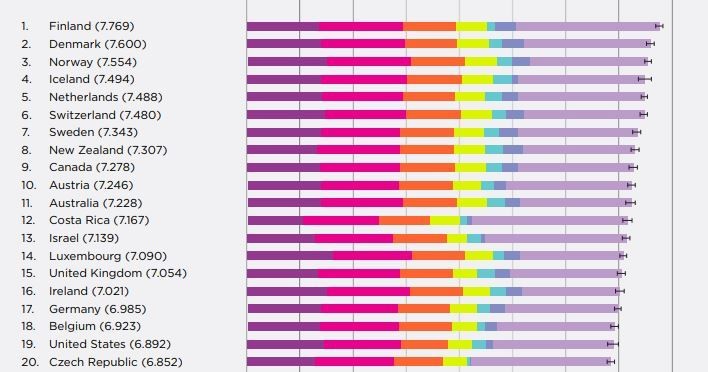Finland is the world’s happiest country – again

The happiest place on Earth? Image: REUTERS/Petr Josek

Get involved with our crowdsourced digital platform to deliver impact at scale
Stay up to date:
European Union
The world is getting used to being told that Scandinavian countries are among the best places to live. The release of the 2019 World Happiness Report again confirms that impression with four Nordic countries in the top five happiest nations.
Finland, which headed the table last year, came top again, followed by Denmark, Norway (top in 2017) and Iceland. The Netherlands joined them in the top five. Switzerland, Sweden, New Zealand, Canada and Austria completed the top 10.
The US only made it to number 19, down from 18 last year. The UK was placed 15th, one ahead of Ireland with Pakistan ranked 67 and India 140 out of 156 nations surveyed. Two nations riven by civil strife, South Sudan and the Central African Republic were ranked as the least happy.

It’s easy to see how civil war and insurgencies can bring misery to people, but what really makes a happy nation? The report’s authors insist it's not just about money, even though the top 10 are all affluent countries.
Money can’t buy you happiness
The survey, conducted by Gallup, uses a three-year rolling average of survey responses around six factors: GDP per capita; social support; life expectancy; freedom to make life choices; generosity; and corruption levels. Finland scores well on all factors but particularly strongly on generosity.
The authors say that helping others makes you feel better, but only if you choose to do it. Almost half of Finns donate regularly to charity and almost a third said they had given up time to volunteer for a charity in the previous month.
The Copenhagen-based Happiness Research Institute points out that Finland tops the happiness list despite not having the highest GDP of the Nordic countries. It is the country’s social safety net combined with personal freedom and a good work-life balance that gives it the edge.
The OECD’s Better Life Index suggests that Finland’s sense of wellbeing may also be down to a feeling of personal safety in a troubled world. Finns feel good about their environment, sense of community and public services and education, but they worry about jobs and housing.
As if to prove that you cannot buy happiness, the US sits at number 19, one place down from last year. Although it has the world’s highest GDP, economist Jeffrey Sachs, one of the report’s authors, said worsening health conditions and declines in social trust and trust in government were making Americans less happy.
Any wellbeing benefits from rising incomes in the US were being offset by growing addictions to gambling, social media use, video gaming, shopping and consuming unhealthy foods which were causing unhappiness and even depression, he said.
Governments can make you happy
The World Happiness Report says countries which improve civic engagement by making their government more representative will be happier. Happier populations have higher voter turnout, while political division and declining social trust reduce happiness.
Leading the nations recording the strongest growth in happiness this year was Benin, which has enjoyed a period of stability. The West African nation is ranked 102 in the overall happiness table followed by Nicaragua, Bulgaria, Latvia and Togo. The five sharpest declines were in Venezuela, Syria, Botswana, India and Yemen.
Benin has experienced steady GDP growth in recent years with life expectancy improving. It is part of a welcome trend across sub-Saharan Africa led by the more politically stable nations. Conversely, Venezuela's societal woes and Syria’s civil war have coincided with plummeting happiness levels.

Governments clearly hold the key to their people’s happiness. Tackling corruption, avoiding civil strife and improving basic public services are crucial to success. But so too is enabling people to enjoy personal freedom and encouraging them to participate in civil society. Money helps, of course, but alone it cannot buy you happiness, the report shows.
Don't miss any update on this topic
Create a free account and access your personalized content collection with our latest publications and analyses.
License and Republishing
World Economic Forum articles may be republished in accordance with the Creative Commons Attribution-NonCommercial-NoDerivatives 4.0 International Public License, and in accordance with our Terms of Use.
The views expressed in this article are those of the author alone and not the World Economic Forum.
Related topics:
The Agenda Weekly
A weekly update of the most important issues driving the global agenda
You can unsubscribe at any time using the link in our emails. For more details, review our privacy policy.
More on Geographies in DepthSee all
Naoko Tochibayashi and Naoko Kutty
April 25, 2024
Andrea Willige
April 23, 2024
Libby George
April 19, 2024
Apurv Chhavi
April 18, 2024
Efrem Garlando
April 16, 2024
Babajide Oluwase
April 15, 2024






